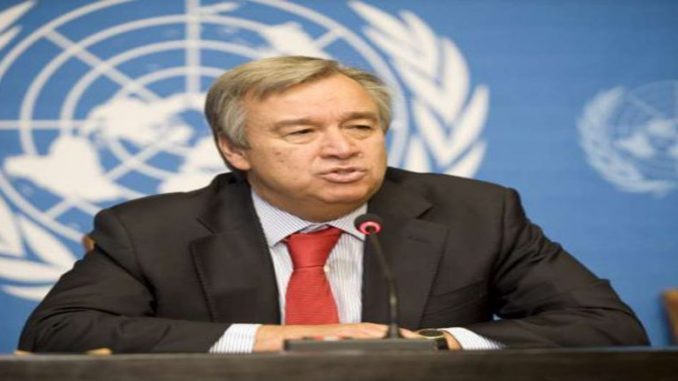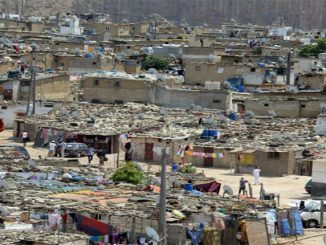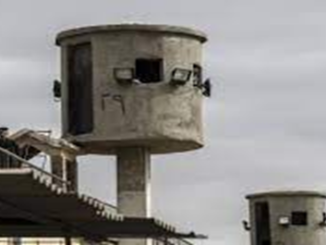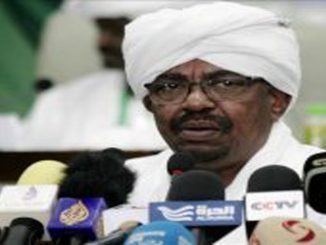
The United Nations Secretary General, Antonio Guterres, has released his much-anticipated annual report entitled “The Situation Concerning Western Sahara.”
The report commends Morocco’s decision to withdraw from the Guerguerat region and calls on the Security Council to urge the Polisario to withdraw from the region.
The report will be submitted to the Security Council pursuant to Resolution 2285 (2016) by which the Council extended the mandate of the United Nations Mission for the Referendum in Western Sahara (MINURSO) through April 30, 2017.
Morocco World News received an advance copy of the report ahead of its scheduled public release date on Tuesday.
Like in previous years, the report calls on the Security Council to renew MINURSO’s mandate for an additional period of one year until April 30, 2017.
The content of the report is certainly not what the Polisario was hoping. The report makes no recommendation to the Security Council to expand the mandate of MINURSO to include the monitoring of human rights in the Western Sahara and the Tindouf camps. In an attempt to politicize the question of human rights, the Polisaio, under the impulsion of Algeria and South Africa, has lobbied for several years to convince the Security Council to expand MINUrSO’s mandate.
The recommendations of the report focused rather on the need to rekindle the deadlocked political process and bring the parties back to the negotiation table, as well as on the situation in the Guerguerat.
The Secretary General stressed that no party has been willing to resume direct negotiations without preconditions to reach a mutually acceptable political solution in line with Resolution 1754 (2007), each of them insists that its proposal is the sole basis for negotiations.
“Each party has a different vision and reading of the history and documents that surround this conflict,” he wrote in his report.
In light of the inability of the outgoing UN Personal Envoy for Western Sahara, Christopher Ross, to help the parties bridge the gap and make progress towards achieving a political solution, the UN chief pointed out that he intends to relaunch the negotiations with a new dynamic and new spirit.
“I intend to propose that the negotiating process be relaunched with a new dynamic and a new spirit that reflects the Council’s guidance,” Guterres said in the report.
Perhaps what’s most striking about this year’s report is the absence of the term the self-determination from the recommendation that calls on the parties to work towards achieving a mutually acceptable political solution.
While in last’s year’s report and the reports of previous years, the UNSG called on the parties to “engage in serious negotiations without preconditions and in good faith to reach a mutually acceptable political solution, which will provide for the self-determination of the people of Western Sahara,” this year’s report calls on the parties to resume negotiations with the “aim of reaching a mutually acceptable political solution that includes resolution of the dispute over the ultimate status of Western Sahara, including through agreement on the nature and form of exercise of self-determination.”
The report seems to put more emphasis on the need that the parties come to an agreement on the nature of self-determination. This principle has been the bone of contention that prevented any serious negotiations between Morocco and the Polisario.
While the Polisario insists that negotiations should not take the option of the independence of the territory off the table, Morocco insists that a mutually acceptable solution as called for in UN resolution adopted since 2007 should be acceptable to both parties, and therefore, should not include independence as an option.
It still early to gauge whether the language used by the new UNSG and his insistence to bring a new dynamic to the political process signal that the UN is backing away from its insistence on the concept of self-determination as necessarily leading to independence.
On the other hand, the UN chief expressed his deep concern with regards to the tension prevailing in the Guerguerat region in the buffer zone between Morocco and Mauritania.
While he commended Morocco for responding positively to his call on the parties to withdraw their security forces from the region, Guterres said he is “deeply concerned by the continued presence of Frente Polisario armed elements and the challenges this poses to the raison d’etre of the buffer strip.”
To avoid that the situation slide into an armed conflict in the region and that the Polisario impose a fait accompli by establishing a permanent presence in the Guerguerat, the UN chief calls on the Security Council to urge to the Polisario to withdraw immediately and without conditions.
“Recognizing that the current situation risks a breakdown of the ceasefire regime, I ask the Security Council to urge Frente Polisario also to withdraw the Buffer Strip in Guerguerat full and unconditionally.”
On the other hand, while previous annual report included a call on the Security Council to consider the “registration of refugee camps near Tindouf,” this year’s report makes no such recommendation.



